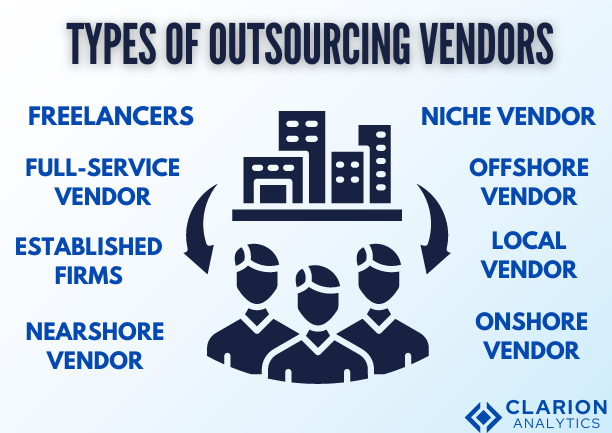
Startups operating in present-day competitive business landscape must deal with multiple obstacles including restricted funds alongside small financial allocations along with continuous demands to be innovative and increase market presence. The strategic move of outsourcing serves as a solution which allows startups to scale their operations by working with external professionals. This article serves as your start-up guide which analyzes essential criteria startups must understand when they want to achieve success and sustainable growth through outsourcing decisions.
1. Introduction to Startup Outsourcing
Startup companies increasingly adopt outsourcing because it lets them connect to expert talent and cut spending while keeping their main business objectives the forefront. Startups now benefit from an expanding global outsourcing market which provides them various vendor selection choices. Pursuing outsourcing services requires careful implementation since it does not work for every business operation. Startups need to strategically explore the available vendor market to find relationship partners that bring genuine business value to their enterprise growth.
2. Understanding the Vendor Landscape
The vendor landscape is vast and varied, with numerous service providers offering a wide array of outsourcing solutions. Understanding this landscape is crucial for startups as it helps them identify potential vendors that align with their specific needs. The vendor landscape can be broadly categorized into several types:
a. Local vs. Offshore Vendors
Local vendors are based in the same country as the startup, offering the advantage of similar time zones, cultural alignment, and easier communication. Offshore vendors, on the other hand, are located in different countries, often offering cost savings due to lower labor costs. Startups must weigh the pros and cons of both options based on their priorities.
b. Niche vs. Full-Service Vendors
Niche vendors specialize in specific areas, such as software development, marketing, or customer support. Full-service vendors offer a broader range of services, making them a one-stop-shop for multiple outsourcing needs. Startups should assess whether they need specialized expertise or a comprehensive solution.
c. Freelancers vs. Established Firms
Freelancers offer flexibility and can be a cost-effective option for startups with limited budgets. However, they may lack the resources and stability of established firms. Established firms, on the other hand, provide more reliability, a larger team, and the ability to scale services as needed.
d. Onshore vs. Nearshore vs. Offshore Outsourcing
- Onshore Outsourcing: Involves partnering with vendors within the same country.
- Nearshore Outsourcing: Involves partnering with vendors in neighboring countries with minimal time zone differences.
- Offshore Outsourcing: Involves partnering with vendors in distant countries, typically with significant cost advantages but also potential communication challenges.
Understanding these distinctions is vital for startups as they begin their search for the right outsourcing partner.

Are you intrigued by the possibilities of AI? Let’s chat! We’d love to answer your questions and show you how AI can transform your industry. Contact Us
3. Defining Your Outsourcing Needs
Before diving into the vendor selection process, startups must clearly define their outsourcing needs. This involves identifying the specific tasks or functions that can be outsourced, the goals they aim to achieve through outsourcing, and the expected outcomes.
a. Core vs. Non-Core Activities
Startups must distinguish between core activities, which are central to their business mission, and non-core activities, which can be outsourced to free up internal resources. Outsourcing non-core activities such as payroll processing, customer service, or IT support allows startups to focus on their core competencies.
b. Project Scope and Objectives
Clearly defining the project scope, including the tasks to be outsourced, timelines, and deliverables, is crucial for successful outsourcing. Startups should outline their objectives, whether it’s reducing costs, accelerating time-to-market, or accessing specialized skills.
c. Resource Availability
Assessing internal resource availability is essential to determine what can be outsourced. Startups should consider whether they have the necessary in-house expertise to manage outsourced tasks effectively or if they require vendor support.
4. Identifying the Right Vendor
Identifying the right vendor is a critical step in the outsourcing process. The right vendor will not only have the expertise and resources needed to deliver on the project but will also align with the startup’s culture, values, and long-term goals.
a. Vendor Research and Shortlisting
Startups should begin by researching potential vendors, gathering information on their services, expertise, and client testimonials. Online platforms such as Clutch, Upwork, and LinkedIn can be valuable resources for finding reputable vendors. Creating a shortlist of vendors based on preliminary research will help streamline the selection process.
b. Request for Proposal (RFP) Process
Issuing a Request for Proposal (RFP) is an effective way to gather detailed information from potential vendors. The RFP should include the project scope, objectives, budget, timelines, and any specific requirements. Startups can then evaluate vendor responses to assess their capabilities and fit.
c. Vendor Interviews and Assessments
Conducting interviews and assessments with shortlisted vendors provides deeper insights into their approach, expertise, and ability to deliver. Startups should ask vendors about their experience with similar projects, team structure, communication practices, and how they handle challenges.
5. Evaluating Vendor Expertise and Experience
The expertise and experience of a vendor play a significant role in the success of outsourcing. Startups should thoroughly evaluate the vendor’s capabilities to ensure they can deliver high-quality results.
a. Industry Experience
Vendors with experience in the startup’s industry are more likely to understand the specific challenges and requirements. They can provide valuable insights and solutions that are tailored to the industry’s unique needs.
b. Technical Expertise
For technical projects, such as software development or IT services, the vendor’s technical expertise is paramount. Startups should assess the vendor’s proficiency in the required technologies, programming languages, and tools. Reviewing case studies and past projects can provide a clear picture of the vendor’s capabilities.
c. Scalability
As startups grow, their outsourcing needs may evolve. It’s important to choose a vendor that can scale their services in line with the startup’s growth. This includes having the capacity to handle increased workloads, expanding the scope of services, and adapting to new requirements.
d. Innovation and Problem-Solving Skills
Startups thrive on innovation, and their vendors should share this mindset. A vendor’s ability to think creatively, solve problems, and offer innovative solutions can add significant value to the outsourcing partnership.
Are you intrigued by the possibilities of AI? Let’s chat! We’d love to answer your questions and show you how AI can transform your industry. Contact Us
6. Assessing Vendor Reliability and Reputation
Service providers who have a lot of familiarity with the industry of the new company would be able to suggest correct and effective solutions for its problems.
a. Technical Expertise
When you are working on a technical project, for example, software development or IT services, technical skills of a vendor are of utmost importance. If you are a startup, it is essential to assess the technical proficiency of the vendor in the specific technologies, programming languages and tools that you need. Looking at previous projects and case studies are essential to get an understanding of the capabilities of the vendor.
b. Scalability
As startups develop, their outsourcing requirements may change. It is necessary to choose a vendor who can increase service capacity in line with startup growth. This involves being able to handle increased workloads, offering a wider range of services, and meeting new requirements.
c. Innovation and Problem-Solving Skills
Startups are successful by thinking differently, so their suppliers should do the same. If a supplier can think outside the box, solve problems and come up with fresh solutions, they can do a lot to help the company.

7. Managing Communication and Collaboration
Effective communication and collaboration are the cornerstones of a successful outsourcing partnership. Startups must establish clear communication channels and collaboration practices to ensure smooth project execution.
a. Communication Tools and Platforms
Startups need to choose appropriate tools and platforms to stay in touch with their vendor. Through Slack and Zoom as well as Asana businesses can achieve instant communication and handle project organization and track tasks.
b. Regular Updates and Reporting
A scheduled update system enables projects to stay on schedule while making possible adjustments in real time. The startup should create a reporting schedule which combines weekly or bi-weekly meetings between themselves and vendors for the purpose of tracking progress along with resolving issues and planning future work.
c. Collaborative Workflows
Efficiency and transparency will increase when the startup joins forces with the vendor for collaborative workflow development. The vendor should participate in major business decisions and startups should establish open lines of communication to create better partnerships.
d. Conflict Resolution
A partnership will experience conflicts yet the approach to managing these disputes determines how much difference it creates. The start-up team must work with their vendor to establish conflict resolution methods which include detailed procedures to handle and settle problems.
8. Addressing Legal and Compliance Issues
Legal and compliance are important aspect for outsourcing. Both are important for startups as they deal with sensitive data, intellectual property and cross border partnership. So start up should make sure that their outsourcing contract complies with the laws and regulations.
a. Data Security and Privacy
Security of data is very important, particularly for startups that handle the client as well as intellectual data. Startups must see to it that the vendor has robust security measures to take care of the data. For instance, the vendor must have strong data encryption mechanisms, secure access control and regular security audits.
b. Intellectual Property (IP) Protection
It is very important to protect copyrights when you outsource operations, such as software developing activity or creative design work. When working with outsourcers, startups must have a contract that clearly states that the startup owns all copyrights to the project, the outsourcer has no right to use it.
c. Compliance with Local Laws
Following the local laws should be a top priority when starting cross-border outsourcing. A startup should ensure that the supplier is following all the rules and regulations that apply to their business. At a minimum, these should include employment, taxation, and standards for the industry.
d. Contractual Agreements
Clear and comprehensive contracts are very important for legal protection. A start-up must ensure that the contract contains detailed conditions about the schedule, terms and conditions, payment plans, and confidentiality.
Are you intrigued by the possibilities of AI? Let’s chat! We’d love to answer your questions and show you how AI can transform your industry. Contact Us
9. Managing Costs and Budgeting
Startups must handle cost management well when they outsource because they have a budget that has to be respected so they can outsource effectively.
a. Transparent Pricing Models
New business enterprises should strive to engage vendors who have pricing plans that are easy to understand, thus enabling the business to assess the financial burden of the prospective partnership. They should also be aware of the payment structure of the vendor, including whether it is project based, by the hour, or based on a range of milestone targets.
b. Cost Control Mechanisms
Cost control strategies in place prevent the occurrence of budget overshooting. In the case of startups, it would be essential to set a budget limit for the project and agree on cost control measures with the vendor. Regularly reviewing the budget and agreeing to additional expenses would help.
c. Value for Money
Even though the price is a significant factor, start-ups should also look into the value for money that the vendor offers. It requires an assessment of the services’ quality, the vendor’s expertise, and the expected return on investment.
d. Contingency Planning
Hidden charges can also come up during outsourcing, so contingency planning is a must. Startups should put out a separate budget for such surprises and also make sure the vendor incorporates the budget limits in his/her costs.
10. Mitigating Risks in Outsourcing
Outsourcing comes with its own risks, including quality concerns, tardiness issues, and ineffective communication. New startups have to identify and reduce these risks to ensure their outsourcing strategies are successful.
a. Risk Assessment and Management
Working on a comprehensive risk assessment at the beginning of the project assists in detecting probable risks and their consequences. Startups should collaborate with the vendor to devise a risk management plan that mitigates and handles risks as they occur.
b. Quality Assurance and Control
Quality control and assurance are essential to ensure the vendor delivers a high-quality product. Start-ups should set standard quality and process review procedures to monitor the vendor’s work and make sure it meets requirements.
c. Backup Plans
It is crucial for startups to have backup plans prepared to deal with any potential disruptions due to reasons like vendor failure or project delays. They should have an alternative vendor or solution in place that can be easily switched to.
d. Vendor Contracts and SLAs
Well-defined contracts and Service Level Agreements (SLAs) provide a framework for managing risks. Startups should ensure that the contract includes clear terms regarding deliverables, timelines, quality standards, and penalties for non-compliance.

11. Monitoring and Measuring Success
Monitoring and measuring the success of outsourcing initiatives is crucial for ensuring that the partnership delivers the desired outcomes. Startups should establish metrics and KPIs to track progress and assess the effectiveness of the outsourcing arrangement.
a. Key Performance Indicators (KPIs)
Having Key Performance Indicators is an avenue for outlining the project’s success in outsourcing. The measurement of well-defined metrics like time for completion, money saved, quality along with client happiness is encouraged. It is necessary to regularly track these KPIs keeping startups in check about the vendor’s performance.
b. Regular Performance Reviews
Initiating regular performance evaluations with the vendor enables for constant assessment and feedback. Startups need to organize frequent appraisals to discuss the vendor’s performance, look into any challenges, and tweak operations where necessary.
c. Feedback Mechanisms
Creating mechanisms for feedback is significant because it allows remarks to go back and forth between the start-up company and the vendor. It is very helpful as this way it allows for improvement as well as helps remove any sort of uneasiness present.
d. Outcome Analysis
Evaluating the final results of outsourcing project is key to the long-term success of the project. Startups must assess whether the project met its objectives, added value, and had positive impacts on the startup.
12 Conclusion
The search process for outsourcing vendors presents a complicated route which brings rewarding benefits to start-up businesses. Startups who select proper outsourcing partners through detailed consideration of supplier expertise alongside reliability and cultural synergy together with cost management and risk control measures will achieve successful outsourcing results. Building strong outsourcing relationships depends on open communication and mutual dependence and unified efforts toward startup objective fulfillment.
Also Read:
Navigating the Vendor Landscape and Outsourcing effectively can significantly accelerate startup and enterprise growth, beginning with insights from How IT Outsourcing Can Elevate Your Business’s Competitiveness to New Heights, which highlights the strategic advantages of partnering with the right vendors. This approach is closely tied to Digital Transformation and ESG: 101, where sustainability, governance, and responsible practices influence vendor selection. To drive innovation, AI Consulting: Transform Your Business with Expert Guidance demonstrates how expert partners help align technology with business goals, while MERN Stack Best Practices for Scalable and Efficient Development and Ultimate MEAN Stack and Agile DevOps: Enhancing Deployment Efficiency showcase how capable vendors enable scalable architectures and faster delivery. Ensuring long-term stability, Node.js Security: Best Practices for a Robust Production Environment underscores the importance of choosing outsourcing partners with strong security and production readiness.
Are you intrigued by the possibilities of AI? Let’s chat! We’d love to answer your questions and show you how AI can transform your industry. Contact Us
